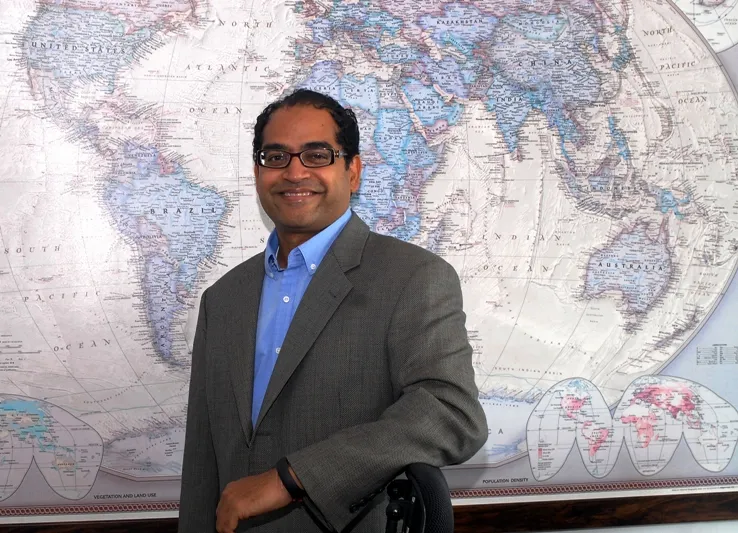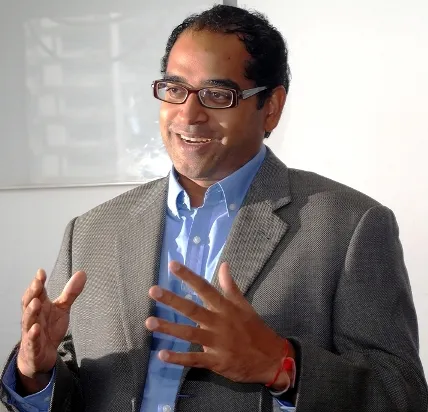The investor who thinks like an entrepreneur - Niren Shah of Norwest Venture Partners
Niren Shah heads the India arm of $3.74-billion global venture capital and growth equity investment firm, Norwest Venture Partners (NVP). The 51-year old fund has a track record of investing in many successful startups and has a very good strike rate with the investments it makes. Among its India investments are Persistent Systems, Pepperfry.com, Komli Media, Suvidhaa, Yes Bank and Yatra.com among others. A small team of eight manages the India affairs and Niren is one of the MDs who oversee the action. After many weeks of co-ordination, we met the ace financer who has donned many interesting hats, before turning a venture capitalist. In a free wheel chat Niren speaks to YourStory.com about NVP’s way of doing business. Excerpts.
Meet the man
Travelling a long distance to meet the man was no excuse to be late, but the five minute delay I had due to confusion in identifying the venue was enough to stress me out. But when Niren entered the meeting room, his smiling and cheerful face put me at ease. Maybe this is the difference between meeting people who work with entrepreneurs versus those who deal with corporates I thought – the former, to which Niren also belongs – are so much more nicer.

Niren has been an achiever all through, from his college days to early career life to leading businesses to now heading NVP in India; he has always been on top and done it all with much panache. You can read his bio in detail here, but to give a snapshot, Niren has traded shares on the Bombay Stock Exchange while he was still in college and then worked at KPMG, Baazee.com and eBay before joining NVP.
He is a trained chartered accountant and has been involved with startups and entrepreneurs for most part of his professional life. Though he is trained in finance, Niren is equally conversant with technology and internet spaces, and it is this vast experience across the different sectors that he successfully draws upon in his role as the Managing Director at NVP India. While we don’t think he gets too much free time, Niren says he likes to spend time with family and friends during his day off.
How is NVP as an investor?
“NVP is a 51-year old fund and the founders were visionary about venture capital as a class. Right from the word go Norwest has done really well, because our focus has always been on entrepreneurship and entrepreneurs,” explains Niren. Since starting, the fund has invested in over 500 companies, which has been instrumental in the diverse experience that its managing partners have. Investee companies belong to Israel, US and India across varied sectors. “There is a very clear Norwest way of doing things. Which is effectively a very strong culture, it is pro entrepreneurship. We definitely believe in spending a lot of time with the company. It’s not just that we spend some money and move on, we spend a lot of time – it is a very empowering culture, we find a great management team and empower them,” says Niren.
NVP always takes a long term view of all investments that it does, and therefore would stay invested in a company for upto 8 years. This patience in approach is not just for its venture capital investment, but also the private equity space, where it can stay invested for almost a decade. Even for Niren to personally deploy his first dollar took 15 months since he joined, and even at that point his colleagues and managing partners were telling him to not be in a hurry, shares Niren to emphasize his point.
Just like Niren, most NVP partners have strong experience in running a company and therefore are able to relate well to the ups and downs that come in the entrepreneurship journey. “What we do is not theoretical. When I was part of a company called Baazee, I didn’t meet my plan, so an investor looked at me squarely in the eye and said you must meet your plan. It didn’t help much at that time. We were all young guys and what we needed was guidance and direction. We do that in Norwest. But yes there is someone who can say, you are not meeting your target. But we also say, maybe you should think of the following options. There is a fine line between interfering and empowering, and we try very hard to balance that,” says Niren.
As a global fund, NVP has one pool of capital and does not have any regional allocation of funds. Different Norwest offices across geographies discuss and vote on every investment that happens through weekly video calls. “A lot of people are voting on my deals, and lot of times I am voting on other deals. So that it doesn’t end up becoming a very regional thing, while regional is important, there is a lot of cross pollination,” explains Niren. This information sharing is not restricted to just investment decisions but best practices are also shared across areas like HR, training, sales and more.
When the investments being made are in early stage companies, the bet taken by NVP is that the venture will be able to disrupt the market, provided there is one. There maybe big incumbents in the market, but the startup’s ability to disrupt and scale is the key bet. “You are always taking some leaps of faith. Along the way some of our major companies have had pivots, what they have started with is not what they ended with. Some of our biggest exits -- like billion dollar plus exits -- have had pivots as well. So what you are really investing in is a great management team. It could probably be a little nuance because of which the market did not pan out as it should. But a good management team will always pivot,” explains Niren.
Sectors of interest & ticket size
NVP is well-known for its technology investments and also has interests in SaaS, Internet, e-commerce, healthcare, consumer, education and infrastructure. But more than being sector focused, Niren says it is the market opportunity and the management team at the startup that influences their decision making. “We are looking for an extremely strong management team, a market, a company which can grow -- not like 5-10% growth, but multiples of that. Then we are looking for a robust sector that has demand or growth that the country needs,” says Niren. He illustrates his point through the BFSI space in India, which he says should continue to grow at a rate of 15-20% for the next 20 years. “Our banking sector is one-ninth of China’s banking sector and our entire banking sector is smaller than the largest bank in the US. If you look at the next 20 years, it is a sector that will do well. There will certainly be ups and downs, but what we are looking for is a growth and positive macro,” shares Niren. NVP has investments in IndusInd Bank, ING Vysya Ratnakar Bank and Yes Bank in India. Another thing the fund has learnt about India, is they need to have a good understanding of the regulatory framework, and they take good effort to understand and be in complete compliance of it, says Niren.

NVP investments spans a wide scale, so they can do $500,000 seed funding and in case of late stage growth equity, they can write cheques upto $75 million. Currently, NVP has $3.7 billion worth of total assets under management. Every few years they raise a fund, which has the life of about a decade, post which they would go out and raise another round. The source for funds is institutional capital and mostly done globally. So far NVP has not taken any growth capital from India. “Some funds raise money domestically, but ours is more a global venture capital and growth equity focused funding. We don’t do specific market focused money rising, it’s all one global pool. It gets allocated to India and then we deploy it in promising ventures,” he says.
Indian Economy and opportunities
Niren says he is happy about a lot of policy level changes that the country is currently undergoing. From increase in repo rate to the one man company incorporation, all decisions should be taken keeping in mind the target class involved suggests Niren. “Everywhere in the world, banking and finance has got more and more regulated and it is good that we have a proactive regulator(RBI) than a reactive one. The long term story is very much intact in India, we are trying to understand the reform process that has again kickstarted and lately there have been more reforms. People are now waiting for the election and the results will show where the markets end up,” he predicts.
Why India is still at a nascent stage when it comes to product ventures?
Over the course of our discussion, the topic of good quality products from India comes up. Though it has been a cause of concern, Niren says there is definitely a sea change happening there. He is optimistic that in the next 5-10 years we will see a lot more product development happening from India. “The most important part is whether it’s a quality product, how it is built and which market are you going after. Lot of companies today are tiny, but will become big. But given our GDP per capita, the products that these companies make will have to be rolled out atleast in South East Asia, if not globally. So be an accounting product, food product, or anything, most companies we talk to feel India market may not be enough to support their plans,” he says.
The fact that India is a price sensitive market will also ensure that entrepreneurs learn to make and sell products in an extremely stressed environment. “If you goto a customer with a SaaS product in the US, it is very easy to charge $2000-3000 per month in the US. In India, if you tell a guy that I will charge you Rs 1 lakh for a product, he will ask you for Rs 20,000. Overtime we need a global company based in India. What we need is a good product that can be useful in number of markets and then we need development horsepower, which we already have at probably one-third of the cost. Lot of the global products can come from India, for the same reason that telecom products can come from here,” reasons Niren.
So has this successful investment banker, fund manager every thought of starting up on his own, we ask? Niren admits he was very close to starting up when he decided to move back to India in 2008, as there were many people willing to invest and partner with him. However he says his role in Norwest is letting him live his dream of being an entrepreneur. “Here I am working with not one, but multiple startups and there is a lot of joy in that. I get very involved with startups that I am working with. I work with 12 ventures -- 6 late stage and 6 early stage,” he explains. But maybe after he has had his share of being on this side of the table, Niren may eventually roll up his sleeves and build another venture like Baazee.com when the time is right. Until then…







